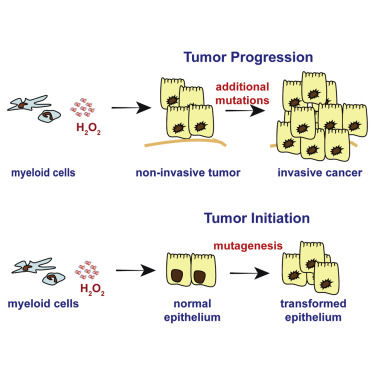当前位置:
X-MOL 学术
›
Cancer Cell
›
论文详情
Our official English website, www.x-mol.net, welcomes your
feedback! (Note: you will need to create a separate account there.)
Myeloid Cell-Derived Reactive Oxygen Species Induce Epithelial Mutagenesis.
Cancer Cell ( IF 48.8 ) Pub Date : 2017-Dec-11 , DOI: 10.1016/j.ccell.2017.11.004 Özge Canli , Adele M. Nicolas , Jalaj Gupta , Fabian Finkelmeier , Olga Goncharova , Marina Pesic , Tobias Neumann , David Horst , Martin Löwer , Ugur Sahin , Florian R. Greten
Cancer Cell ( IF 48.8 ) Pub Date : 2017-Dec-11 , DOI: 10.1016/j.ccell.2017.11.004 Özge Canli , Adele M. Nicolas , Jalaj Gupta , Fabian Finkelmeier , Olga Goncharova , Marina Pesic , Tobias Neumann , David Horst , Martin Löwer , Ugur Sahin , Florian R. Greten

|
Increased oxidative stress has been suggested to initiate and promote tumorigenesis by inducing DNA damage and to suppress tumor development by triggering apoptosis and senescence. The contribution of individual cell types in the tumor microenvironment to these contrasting effects remains poorly understood. We provide evidence that during intestinal tumorigenesis, myeloid cell-derived H2O2 triggers genome-wide DNA mutations in intestinal epithelial cells to stimulate invasive growth. Moreover, increased reactive oxygen species (ROS) production in myeloid cells initiates tumor growth in various organs also in the absence of a carcinogen challenge in a paracrine manner. Our data identify an intricate crosstalk between myeloid cell-derived ROS molecules, oxidative DNA damage, and tumor necrosis factor α-mediated signaling to orchestrate a tumor-promoting microenvironment causing invasive cancer.
中文翻译:

骨髓细胞衍生的活性氧导致上皮诱变。
已经提出增加的氧化应激通过诱导DNA损伤来引发和促进肿瘤发生,并通过触发细胞凋亡和衰老来抑制肿瘤的发展。肿瘤微环境中单个细胞类型对这些对比作用的贡献仍然知之甚少。我们提供的证据表明,在肠道肿瘤发生过程中,髓样细胞衍生的H 2 O 2在肠道上皮细胞中触发全基因组DNA突变,以刺激侵袭性生长。此外,在不存在致癌物激发的旁分泌方式下,髓样细胞中增加的活性氧(ROS)产生也会在各个器官中引发肿瘤生长。我们的数据确定了髓细胞来源的ROS分子,氧化性DNA损伤和肿瘤坏死因子α介导的信号之间的错综复杂的串扰,以协调引起肿瘤的微环境。
更新日期:2017-12-11
中文翻译:

骨髓细胞衍生的活性氧导致上皮诱变。
已经提出增加的氧化应激通过诱导DNA损伤来引发和促进肿瘤发生,并通过触发细胞凋亡和衰老来抑制肿瘤的发展。肿瘤微环境中单个细胞类型对这些对比作用的贡献仍然知之甚少。我们提供的证据表明,在肠道肿瘤发生过程中,髓样细胞衍生的H 2 O 2在肠道上皮细胞中触发全基因组DNA突变,以刺激侵袭性生长。此外,在不存在致癌物激发的旁分泌方式下,髓样细胞中增加的活性氧(ROS)产生也会在各个器官中引发肿瘤生长。我们的数据确定了髓细胞来源的ROS分子,氧化性DNA损伤和肿瘤坏死因子α介导的信号之间的错综复杂的串扰,以协调引起肿瘤的微环境。











































 京公网安备 11010802027423号
京公网安备 11010802027423号